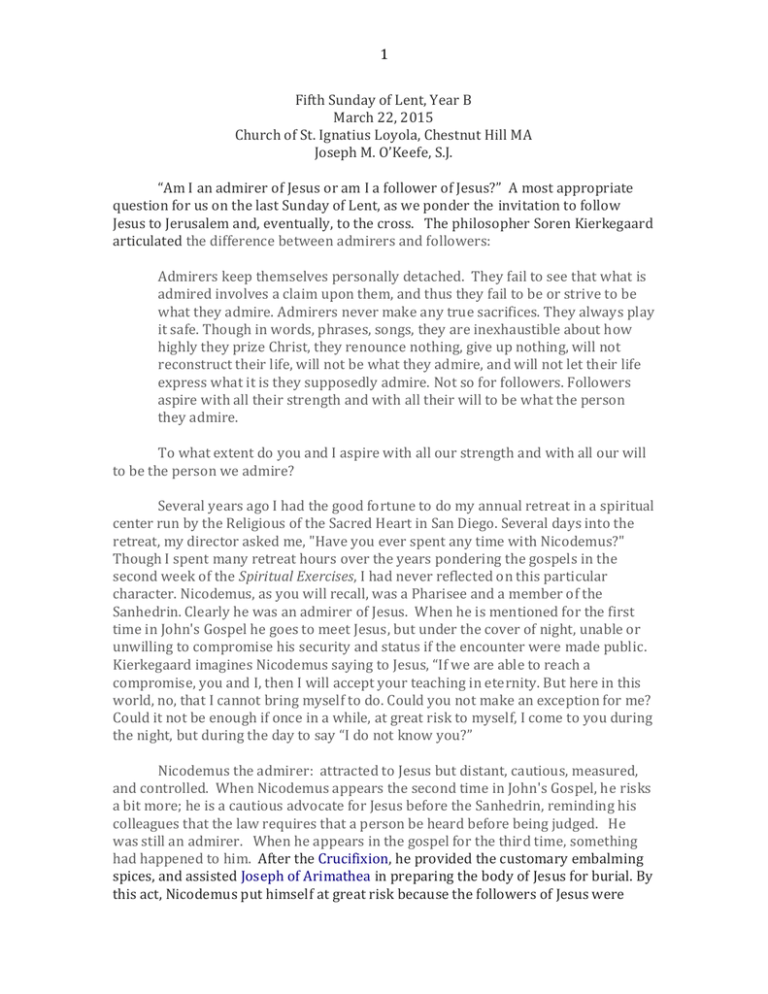1 Fifth Sunday of Lent, Year B March 22, 2015
advertisement

1 Fifth Sunday of Lent, Year B March 22, 2015 Church of St. Ignatius Loyola, Chestnut Hill MA Joseph M. O’Keefe, S.J. “Am I an admirer of Jesus or am I a follower of Jesus?” A most appropriate question for us on the last Sunday of Lent, as we ponder the invitation to follow Jesus to Jerusalem and, eventually, to the cross. The philosopher Soren Kierkegaard articulated the difference between admirers and followers: Admirers keep themselves personally detached. They fail to see that what is admired involves a claim upon them, and thus they fail to be or strive to be what they admire. Admirers never make any true sacrifices. They always play it safe. Though in words, phrases, songs, they are inexhaustible about how highly they prize Christ, they renounce nothing, give up nothing, will not reconstruct their life, will not be what they admire, and will not let their life express what it is they supposedly admire. Not so for followers. Followers aspire with all their strength and with all their will to be what the person they admire. To what extent do you and I aspire with all our strength and with all our will to be the person we admire? Several years ago I had the good fortune to do my annual retreat in a spiritual center run by the Religious of the Sacred Heart in San Diego. Several days into the retreat, my director asked me, "Have you ever spent any time with Nicodemus?" Though I spent many retreat hours over the years pondering the gospels in the second week of the Spiritual Exercises, I had never reflected on this particular character. Nicodemus, as you will recall, was a Pharisee and a member of the Sanhedrin. Clearly he was an admirer of Jesus. When he is mentioned for the first time in John's Gospel he goes to meet Jesus, but under the cover of night, unable or unwilling to compromise his security and status if the encounter were made public. Kierkegaard imagines Nicodemus saying to Jesus, “If we are able to reach a compromise, you and I, then I will accept your teaching in eternity. But here in this world, no, that I cannot bring myself to do. Could you not make an exception for me? Could it not be enough if once in a while, at great risk to myself, I come to you during the night, but during the day to say “I do not know you?” Nicodemus the admirer: attracted to Jesus but distant, cautious, measured, and controlled. When Nicodemus appears the second time in John's Gospel, he risks a bit more; he is a cautious advocate for Jesus before the Sanhedrin, reminding his colleagues that the law requires that a person be heard before being judged. He was still an admirer. When he appears in the gospel for the third time, something had happened to him. After the Crucifixion, he provided the customary embalming spices, and assisted Joseph of Arimathea in preparing the body of Jesus for burial. By this act, Nicodemus put himself at great risk because the followers of Jesus were 2 likely to suffer the fate of Jesus. Nicodemus, it seems, had gone from being an admirer to being a follower. According to tradition, Nicodemus died a martyr for Christ. In recent days our attention has been brought to a more contemporary Nicodemus. Last week we learned that Oscar Romero will be beatified this coming May 23. During his early years of priesthood, and when he was appointed auxiliary bishop, the oligarchs who maintained the unjust social structures of El Salvador were delighted. Romero was cautious and conservative, skeptical of anything that would disrupt the status quo. We know what happened to him. Romero, it seems, had gone from being an admirer to being a follower, a follower who had fallen in love and, as is the case for lovers, was willing to pay any price for the sake of the beloved. In response to the violence, terror and hatred around him, he did not choose the easy path. Rather, he put himself in harm’s way as an advocate of God’s beloved poor. On March 24, 1980, thirty-five years ago this coming Tuesday, as a follower and imitator of Christ, he put his life on the line. Minutes before he was murdered at the altar, he preached on today’s gospel text. He said, “You have just heard in Christ’s Gospel that one must not love oneself to avoid getting involved in the risks of life that history demands of us, and that those who try to fend off the danger will lose their lives, while those who, out of love for Christ give themselves to the service of others will live, live like the grain of wheat that dies, but only apparently. If it did not die, it would remain alone.” He concluded, “The harvest comes about only because it dies, allowing itself to be sacrificed in the earth and destroyed. Only by undoing itself does it produce the harvest.” Christ does not ask us to be admirers. He asks us to be followers and sometimes followers fall. Christ’s path can be steep and rocky, but we can be assured that He is with us on the way. When the cross becomes too heavy to bear He sends us modern-day Simon of Cyrenes to lighten our load and bear our burden. When we feel abandoned and alone, he sends modern-day Veronicas to comfort us. Christ does not chide us for falling short. Remember his lament ,“I am troubled now. Yet what should I say? ‘Father, save me from this hour’?” He understands our fear and reluctance –He asks only that, when we fall, we pick ourselves up and continue on the path that leads through death to life. Christ does not ask us to be admirers, devotees who venerate Him from a safe distance. He asks us to be followers and followers fall in love. And lovers are willing to pay any price for the sake of the beloved, and to do so gladly. During these waning days of Lent, as we prepare to prepare to follow Jesus to Jerusalem and Calvary, I invite us to follow the advice that the wise RSCJ gave to me many years ago: Reflect on the character of Nicodemus, admirer turned follower. I would imagine that, like myself, many of you can see yourselves in him. And on this coming Tuesday, the 35th anniversary of Romero’s assassination, l invite us to pray that, by his example and by his intercession, we may fall in love with the Lord and, 3 casting caution to the wind, lay down our lives for Christ’s sake so as to rise with Him to new and eternal life. An admirer of Jesus or a follower of Jesus – which one are you? An admirer of Jesus or a follower of Jesus – which one do you want to be?








